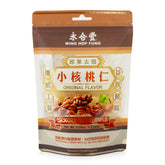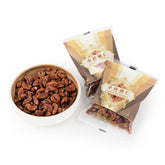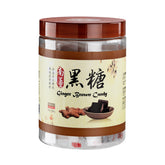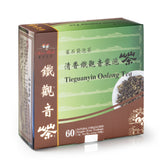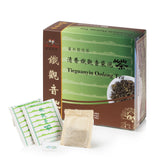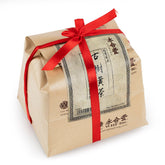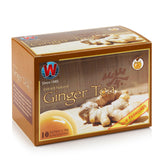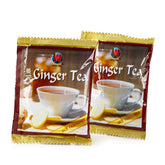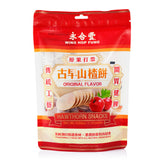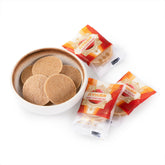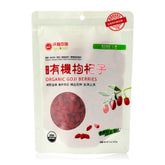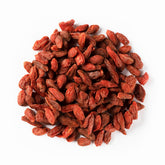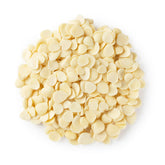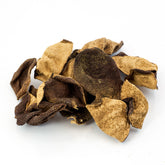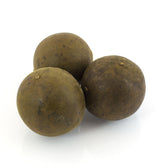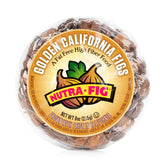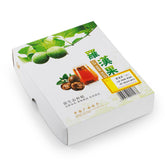Traditional Herbal

-
【Benefits】 Lotus seeds are well - known for their multiple health benefits. They can nourish the heart and calm the mind, effectively relieving symptoms like insomnia, palpitations, and anxiety. By tonifying the spleen and stopping diarrhea, they help improve digestive function and are beneficial...
- from $13.99
- from $13.99
- Unit price
- per
-
【Benefits】 Red dates are effective in nourishing blood and promoting the production of body fluids. They can improve the function of the spleen and stomach, relieve symptoms of weakness and indigestion. Rich in nutrients, they help enhance the body's resistance and have a certain...
- $8.99
- $8.99
- Unit price
- per
-
【Benefits】 Glazed jujubes are rich in nutrients that can nourish the body and improve the function of the spleen and stomach, helping to enhance digestion. They contain substances that are beneficial for maintaining the health of the cardiovascular system, such as antioxidants that can...
- $8.99
- $8.99
- Unit price
- per
-
有机枸杞 8 oz/包 沃福百瑞 德国BCS有机认证 全美枸杞销量第一 性味 味甘;性平 经脉 归肝经;肾经;肺经 主治 滋肾,润肺,补肝,明目。治肝肾阴亏,腰膝酸软,头晕,目眩,目昏多泪,虚劳咳嗽,消渴,遗精。 【食疗方】 1.参杞酒 党参15克,枸杞子15克,米酒500毫升。将党参、枸杞子洗净,干燥后研为粗末,放入细口瓶内,加入米酒,密封瓶口,每日振摇1次,浸泡7天以上。每次服15毫升,早晚各服1次。 功效:益气补血、宁心安神。主治心脾两虚、心悸失眠、夜寐多梦、食欲不振、肢体倦怠等。 2.红杞乌参鸽蛋 枸杞子15克,水发乌参2只,鸽蛋12个。将乌参内壁膜去除干净,用沸汤氽两遍,冲洗干净,再用尖刀在腹壁刺成菱形花刀;鸽蛋凉水时下锅,用文火煮熟,捞出投入凉水内,剥壳,放在碗内;枸杞子洗净;葱切段,姜拍破。在锅中注入花生油,烧沸,鸽蛋滚满干豆粉,放人油锅内炸,炸至黄色时捞出。将锅烧热,注入猪油,烧沸,下葱、姜煽炒,随后倒入鸡汤,略煮,捞去姜、葱。投入乌参和适量酱油、料酒、胡椒粉,烧沸后,撇去浮沫,改用文火煨40分钟左右,投入鸽蛋和枸杞子,再煨10分钟,取出乌参和鸽蛋。汁内加入味精调味,用水豆粉勾芡,再淋沸猪油,浇在乌参和鸽蛋上。当点心食用。 功效:功能补肾滋阴,养肝明目。用治精血亏损,虚劳劳怯,阳萎,遗精。 3.杞圆膏 枸杞子、龙眼肉各等份。加水,用小火多次煎熬至枸杞子、龙眼肉无味,去渣继续煎熬成膏,每次1~2汤匙,沸水冲服。 主治肝肾不足,血不养心,腰膝痿软,头昏耳鸣,心悸健忘等症。 4.山楂枸杞饮 山楂、枸杞各15g。二者加沸水冲泡。每日频饮。 功效:适用于病后体虚乏力,食欲不振,消化不良,腰膝酸软,目暗昏花等症。枸杞含有多种不饱和脂肪酸、氨基酸、维生素等成分,具有养阴补血,益精明目之功效,还可保肝、降血压、降血糖,与山楂共用,具有补肝益肾,补血益脑功能。 USDA Organic Goji Berries / Barbary Wolfberry Fruit (8oz) Goji berries, also known as wolfberries or snowberries, are prized...
- $11.99
- $11.99
- Unit price
- per
-
【Benefits】 Dried longan offers numerous health benefits. It is highly effective in nourishing the heart and calming the mind, helping to relieve symptoms of insomnia, anxiety, and restlessness. By replenishing qi and nourishing blood, it can improve blood circulation, alleviate fatigue, and enhance overall...
- from $13.99
- from $13.99
- Unit price
- per
-
【Benefits】 Job's tears can eliminate dampness and strengthen the spleen, effectively relieving discomfort caused by excessive dampness in the body, such as heavy limbs and fatigue. It also promotes urination and reduces swelling, which is beneficial for improving edema symptoms. Additionally, it can moisten...
- $7.99
- $7.99
- Unit price
- per
-
【Benefits】 Wolfberries are believed to be beneficial for maintaining liver and kidney health. They may help with relieving eye fatigue, especially for those who use eyes for long periods. Also, they are thought to be helpful in promoting general well - being and potentially...
- $24.99
- $24.99
- Unit price
- per
-
【Benefits】 South Almonds can moisten the lungs and relieve coughs, helping to ease symptoms of dry cough and reduce phlegm. They also lubricate the intestines and promote bowel movements, effectively alleviating constipation. Additionally, they nourish the body, providing energy and supporting overall health. 【Nicknames】...
- $5.99
- $5.99
- Unit price
- per
-
【Benefits】 Dried tangerine peel can regulate qi and invigorate the spleen, effectively relieving symptoms like abdominal distension, poor appetite, and nausea caused by qi stagnation and weak spleen function. It has the effect of resolving phlegm and relieving cough, making it beneficial for treating...
- $24.99
- $24.99
- Unit price
- per
-
【Benefits】 Luohanguo, also known as Siraitia grosvenorii, is renowned for its excellent lung - moistening and phlegm - resolving properties. It can effectively soothe the throat, relieve coughs, and is particularly beneficial for those with chronic pharyngitis and excessive phlegm. It also has the...
- $5.49
- $5.49
- Unit price
- per
-
【Benefits】 Xiang lotus seeds can tonify the spleen and stop diarrhea, effectively relieving symptoms of weak spleen and loose stools. They nourish the heart and calm the mind, helping to relieve insomnia, anxiety, and improve sleep quality. Additionally, they have the function of tonifying...
- $12.99
- $12.99
- Unit price
- per
-
【Benefits】 In traditional Chinese medicine, processed Northern Apricot Kernel (Bei Xing Ren) is valued for its effects of descending qi to relieve cough and asthma, moistening the intestines to promote defecation. It effectively alleviates symptoms like cough and asthma due to lung qi stagnation,...
- $5.99
- $5.99
- Unit price
- per
-
【Benefits】 Sydney dried is known for its remarkable lung - moistening and cough - relieving effects. It can soothe the respiratory tract, relieve dry cough and itchy throat symptoms, and is beneficial for people with lung heat and cough. It also has the function...
- $12.99
- $12.99
- Unit price
- per
-
【Benefits】 Figs can strengthen the spleen and improve digestion, relieving issues like poor appetite and bloating. They moisten the lungs and suppress coughs, useful for soothing sore throats and reducing excessive phlegm. Additionally, figs help detoxify the body, reduce swelling, and ease symptoms of...
- $7.49
- $7.49
- Unit price
- per
-
【Benefits】 Ophiopogon japonicus, commonly known as Mai Dong, is highly regarded for its various health benefits. It can nourish the yin and moisten the lungs effectively, relieving dry coughs, reducing phlegm caused by lung dryness, and soothing respiratory discomfort. It also has the function...
- $18.99
- $18.99
- Unit price
- per
-
【Benefits】 Adzuki beans (Vigna umbellata) have the effect of promoting diuresis and reducing swelling. They can facilitate the elimination of excess water in the body, relieving symptoms of edema, especially suitable for those with edema caused by spleen deficiency and excessive dampness. At the...
- $7.99
- $7.99
- Unit price
- per
-
【Benefits】 Wolfberries are believed to be beneficial for maintaining liver and kidney health. They may help with relieving eye fatigue, especially for those who use eyes for long periods. Also, they are thought to be helpful in promoting general well - being and potentially...
- $19.99
- $19.99
- Unit price
- per
-
【Benefits】 Hawthorn can invigorate the spleen and promote digestion, especially effective in breaking down greasy food and relieving symptoms of indigestion like fullness and poor appetite. It can also promote blood circulation and remove blood stasis, which helps in alleviating pain caused by blood...
- from $6.99
- from $6.99
- Unit price
- per
-
【Benefits】 Hawthorn can invigorate the spleen and promote digestion, especially effective in breaking down greasy food and relieving symptoms of indigestion like fullness and poor appetite. It can also promote blood circulation and remove blood stasis, which helps in alleviating pain caused by blood...
- from $14.99
- from $14.99
- Unit price
- per
-
【Benefits】 Luohanguo, also known as Siraitia grosvenorii, is renowned for its excellent lung - moistening and phlegm - resolving properties. It can effectively soothe the throat, relieve coughs, and is particularly beneficial for those with chronic pharyngitis and excessive phlegm. It also has the...
- $23.99
- $23.99
- Unit price
- per

